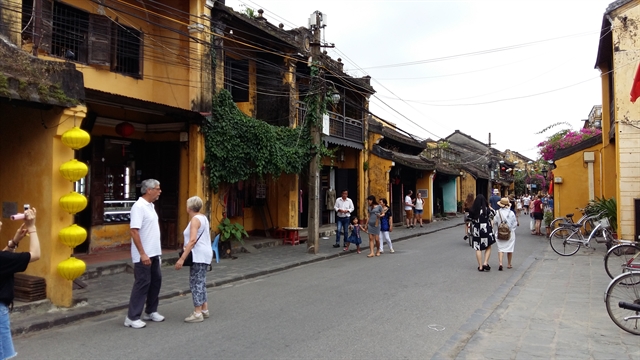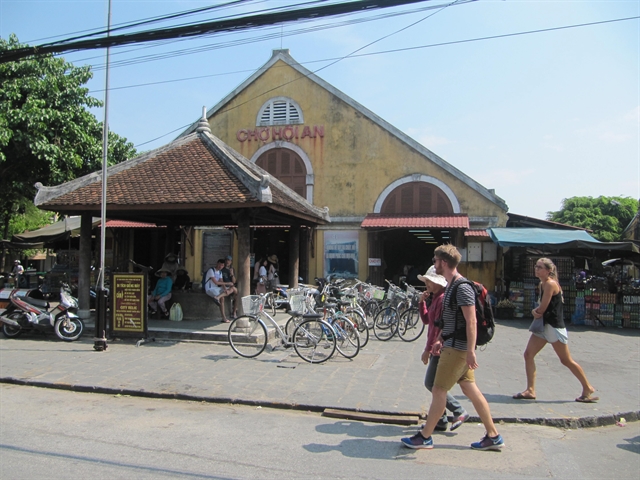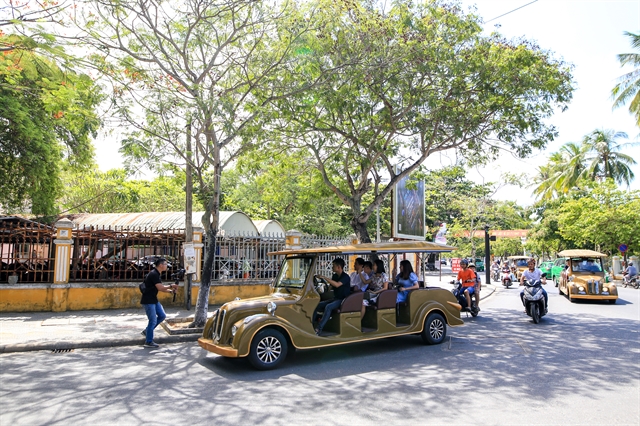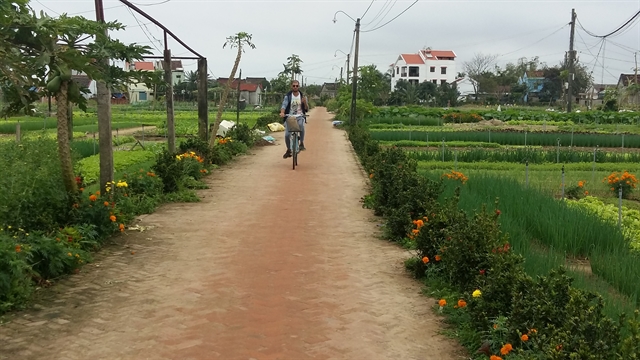 Society
Society


|
| Tourists enjoying an evening in Hội An. Hội An has limited the traffic of cars and buses in the Old Town in easing congestion and environmental pollution. VNS Photo Công Thành |
HỘI AN — The ancient town of Hội An has limited the access of taxis and buses to some streets in the Old Quarter between 11 am and 1:30 pm, and 4 pm to 9 pm.
The city said the adjusted traffic plans aim to ease congestion on overloaded infrastructure in the booming tourism area.
Only electric-powered public transport will be permitted in the Old Quarter and other destinations in Hội An, boosting ‘green’ traffic at the UNESCO-recognised world heritage site.

|
| Tourists pass Hội An market. More streets in the Old Quarter will limit cars to assigned times. VNS Photo Công Thành |
The city’s urban management unit has placed traffic signs on Phan Châu Trinh, Cao Hồng Lãnh, Trần Hưng Đạo, Hai Bà Trưng, Nguyễn Trường Tộ, Ngô Gia Tự, Lý Thường Kiệt, and Trần Quang Khải streets to warn travel agencies preparing for tourists transport plans.
The unit said cars cannot stop, park or use their horns at 14 junctions between certain times in the Old Quarter.
Commuters and tourists can travel from the Old Quarter to the city’s inner stops and public parks to destinations in the old quarter on six electric bus routes.
It’s expected that the city will ban all operations of gasoline-operated vehicles in the Old Quarter by the end of this year, reserving only pedestrians and environment-friendly vehicles such as electric cars or bicycles.
Hội An encourages locals and tourists to raise awareness of good-natured behaviour and hospitality among the community, promoting a friendly tourism environment to make the city the most popular destination in central Việt Nam.

|
| An electric car carries tourists in Hội An. Environment-friendly vehicles are used for public transport in the Old Quarter of Hội An. Photo Trần Trung Quảng |
Residents are urged to stop littering public sites, excessively using horns in traffic, harassing and overcharging tourists and making noise in public places.
Congestion in Hội An has worsened as tourists flock back to the ancient town, while the city’s infrastructure remains limited.
Experts from Japan said the town hosts at least 10,000 vehicles daily, and congestion often occurs in the afternoon when coaches carrying tourists arrive. Motorbikes account for 77 per cent of vehicles in Hội An.
Hội An is an ideal place to encourage people to use bicycles compared to HCM City and Hà Nội, and bicycles are the preferred mode of transport for tourists, women and students.
The city reserved bicycle lanes on some roads under a pilot bicycle-sharing system launched in 2019.
Since 2002, Hội An has earmarked several streets for pedestrian and non-engine vehicles to reduce noise and ensure safety in the old quarter, where many foreign tourists ride bicycles.
Pedestrian areas on streets of Trần Phú, Nguyễn Huệ (in front of Hội An market), Phan Châu Trinh, Công Nữ Ngọc Hoa and the Hoài River Square were expanded in 2017.
The walking zone runs from 9 am to 11 am and from 3 pm to 9.30 pm in the rainy season, or 10 pm in summer. Motorbikes or engine vehicles are allowed access for four hours per day and at night.

|
| A tourist explores Hội An by bicycle. Bicycles are favoured by many tourists in Hội An. VNS Photo Công Thành |
Hội An was the first city in Việt Nam to host a Car-Free Day and the first location in the central province to launch the 3-R (reduce, reuse and recycle) programme while promoting reusable bags and the operation of solar-powered lighting in the city’s square.
The town has targeted the use of 100,000 bicycles among residents and tourists in the coming years. VNS




